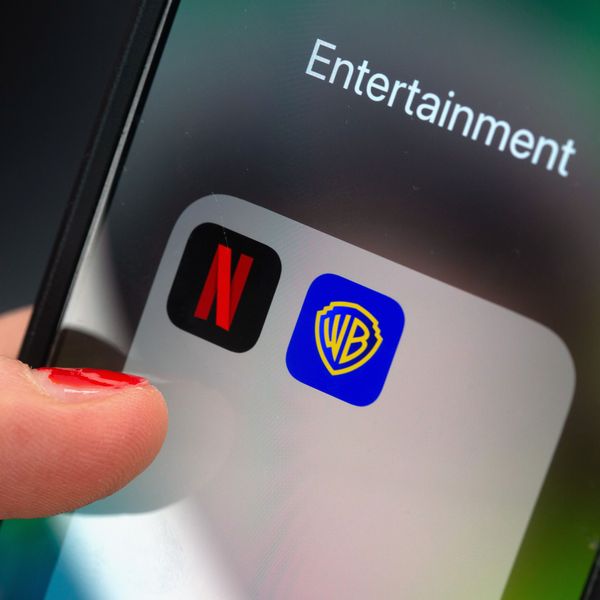Merge of the Titans? Comcast/Time-Warner Deal Called 'Unthinkable'
'This deal would be a disaster for consumers and must be stopped,' say critics

The deal, if approved by regulators, would see Time-Warner, currently the second-largest provider in the U.S., absorbed by its larger rival Comcast in an all-stock agreement. The merger would give Comcast nearly 30 million paying subscribers, roughly a third of the entire U.S. cable market.
Critics, like executive director of the media watchdog group Free Press Craig Aaron, say that though this deal might be good for the corporate titans involved, it will be a disaster for cable customers everywhere.
"In an already uncompetitive market with high prices that keep going up and up, a merger of the two biggest cable companies should be unthinkable. This deal would be a disaster for consumers and must be stopped," said Aaron in a statement.
"Americans already hate dealing with the cable guy -- and both these giant companies regularly rank among the worst of the worst in consumer surveys. But this deal would be the cable guy on steroids -- pumped up, unstoppable and grasping for your wallet."
In order to gain approval, the companies will have to get their agreement past both the FCC and the Department of Justice regulators where concerns over monolopy control of the industry will likely be central to the debate.
According to Aaron, approval of the deal would give Comcast "unprecedented market power over consumers and an unprecedented ability to exert its influence over any channels or businesses that want to reach Comcast's customers."
"Unless the Department of Justice and the FCC do their jobs and block this merger," he said, customers can expect less choice, worse service, and higher bills.
________________________________________
An Urgent Message From Our Co-Founder
Dear Common Dreams reader, The U.S. is on a fast track to authoritarianism like nothing I've ever seen. Meanwhile, corporate news outlets are utterly capitulating to Trump, twisting their coverage to avoid drawing his ire while lining up to stuff cash in his pockets. That's why I believe that Common Dreams is doing the best and most consequential reporting that we've ever done. Our small but mighty team is a progressive reporting powerhouse, covering the news every day that the corporate media never will. Our mission has always been simple: To inform. To inspire. And to ignite change for the common good. Now here's the key piece that I want all our readers to understand: None of this would be possible without your financial support. That's not just some fundraising cliche. It's the absolute and literal truth. We don't accept corporate advertising and never will. We don't have a paywall because we don't think people should be blocked from critical news based on their ability to pay. Everything we do is funded by the donations of readers like you. Will you donate now to help power the nonprofit, independent reporting of Common Dreams? Thank you for being a vital member of our community. Together, we can keep independent journalism alive when it’s needed most. - Craig Brown, Co-founder |

The deal, if approved by regulators, would see Time-Warner, currently the second-largest provider in the U.S., absorbed by its larger rival Comcast in an all-stock agreement. The merger would give Comcast nearly 30 million paying subscribers, roughly a third of the entire U.S. cable market.
Critics, like executive director of the media watchdog group Free Press Craig Aaron, say that though this deal might be good for the corporate titans involved, it will be a disaster for cable customers everywhere.
"In an already uncompetitive market with high prices that keep going up and up, a merger of the two biggest cable companies should be unthinkable. This deal would be a disaster for consumers and must be stopped," said Aaron in a statement.
"Americans already hate dealing with the cable guy -- and both these giant companies regularly rank among the worst of the worst in consumer surveys. But this deal would be the cable guy on steroids -- pumped up, unstoppable and grasping for your wallet."
In order to gain approval, the companies will have to get their agreement past both the FCC and the Department of Justice regulators where concerns over monolopy control of the industry will likely be central to the debate.
According to Aaron, approval of the deal would give Comcast "unprecedented market power over consumers and an unprecedented ability to exert its influence over any channels or businesses that want to reach Comcast's customers."
"Unless the Department of Justice and the FCC do their jobs and block this merger," he said, customers can expect less choice, worse service, and higher bills.
________________________________________

The deal, if approved by regulators, would see Time-Warner, currently the second-largest provider in the U.S., absorbed by its larger rival Comcast in an all-stock agreement. The merger would give Comcast nearly 30 million paying subscribers, roughly a third of the entire U.S. cable market.
Critics, like executive director of the media watchdog group Free Press Craig Aaron, say that though this deal might be good for the corporate titans involved, it will be a disaster for cable customers everywhere.
"In an already uncompetitive market with high prices that keep going up and up, a merger of the two biggest cable companies should be unthinkable. This deal would be a disaster for consumers and must be stopped," said Aaron in a statement.
"Americans already hate dealing with the cable guy -- and both these giant companies regularly rank among the worst of the worst in consumer surveys. But this deal would be the cable guy on steroids -- pumped up, unstoppable and grasping for your wallet."
In order to gain approval, the companies will have to get their agreement past both the FCC and the Department of Justice regulators where concerns over monolopy control of the industry will likely be central to the debate.
According to Aaron, approval of the deal would give Comcast "unprecedented market power over consumers and an unprecedented ability to exert its influence over any channels or businesses that want to reach Comcast's customers."
"Unless the Department of Justice and the FCC do their jobs and block this merger," he said, customers can expect less choice, worse service, and higher bills.
________________________________________

